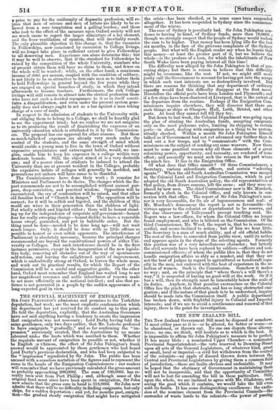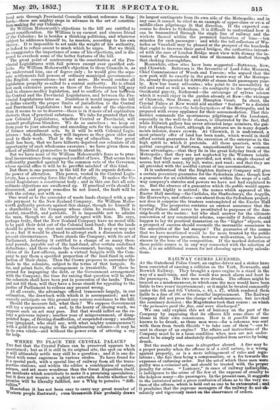THE NEW ZEALAND BILL.
THE New Zealand Government Bill must be disposed of somehow. It must either pass as it is—or be altered, for better or worse—or be abandoned, or thrown out. No one can dispute these alterna- tives; no one, we think, will hesitate as to which is the best. It is impossible to affirm Sir John Palrington's measure to be perfect. It has many blots : a nominated Upper Chamber—a nominated Provincial Superintendent—the veto reserved to Downing Street upon all acts of the General Legislature, of whatever kind, great or small, local or imperial—a civil list withdrawn from the control of the colonists—an apple of discord thrown down between the Central and Provincial legislatures by giving them a common field of jurisdiction,—these are faults obvious and undeniable. It may be hoped that the obstinacy of Government in maintaining them will not be insuperable, and that the opportunity of Committee will not be lost for amending the bill in these particulars. upon the whole, we are inclined to agree with Mr. Gladstone, and, seeing the good which it contains, we would take the bill even with its faults. It has some distinguishing excellences : the exclu- sion of the nominee element from the Provincial Councils—the surrender of waste lands to the colonists—the power of passing local acts through Provincial Councils without reference to Eng- land,—these are mighty steps in advance in the art of constitu. tion-making for our Colonies. Sir William Molesworth's objections to the bill are entitled to great consideration. Sir William is an earnest and sincere friend of the Colonies ; he is besides a thinking politician, and whatever subject he addresses himself to, he masters, according to his own theory. It is impossible to set aside the weight of his authority, or indeed to refuse assent to much which he urges. But we think he exaggerates the importance of some of his objections, and is dis- posed to overlook some of the better features of the bill. The great point of controversy is the constitution of the Pro- vincial Legislatures with full powers except over specified sub. Jed& Sir William Molesworth's objection to these Councils is, as we understand him, one of degree only ; he would give the sepa- rate settlements full powers of ordinary municipal government— like English corporations—but not more. He would confine all legislation properly so-called to a central authority. He is afraid lest such extensive powers as those of the Government bill may lead to chance-medley legislation, and to conflicts of law beffreen the Central and the Provincial Legislatures, and between the Pro- vincial Legislatures inter se. Doubtless it would improve the bill to define exactly the proper limits of jurisdiction to the Central and Provincial Legislatures : but more is made of the objection than it seems to us to deserve—there is in it more of ad eaptandum rhetoric than of practical substance. We take for granted that the new Colonial Legislatures, whether Central or Provincial, will commit prodigious blunders. We do so ourselves : we keep on from year to year amending and amending acts for the amendment of former amendment acts. So it will be with Colonial Legis- latures: but, doubtless, they will improve as they grow older and used to their work. That is the -way of education. Our great fault has been, that we have hitherto deprived our colonists of all opportunity of such wholesome exercises : we have given them no school of political gymnastics to tumble about in.
But we have none of Sir William Molesworth's fears as to prac- tical inconvenience from supposed conflict of laws. That seems tens sufficiently guarded against by the common veto of the Governor, whose special office it will be to prev8nt mischief of this kind. bit there is one panacea In the bill for all its organic defects— the power of alteration. This power, vested in the Central Legis- lature, has a covering force like that of charity. It makes the Co- lonial Legislature a constituent body ; and in this one fact all sub- ordinate objections are swallowed up. If practical evils should be discovered, and proper remedies be not found, the fault will be with the colony, not with us.
One word as to the surrender of waste lands charged with a spe- cific payment to the New Zealand Company. Sir 'William Moles- worth gallantly protests against this charge, though he himself is a shareholder in the Company whose claim he resists. This is manful, unselfish, and patriotic. It is impossible not to admire the man, thoug.h we do not entirely, agree with him. He says, perhaps truly, that the New Zealand Company have no moral title to be paid their debt out of the Colonial land-fund; that the lands should be given up clear and unencumbered. It may or may not be so ; but it would be absurd to attempt such a discussion under present circumstances. There stands the Compans,„ with its act of Parliament, declaring it entitled to a charge of so many thou- sand pounds, payable out of the land-fund, after certain undefined deductions ; and there stands the Government, having, under the advice of its Law-officers, made a virtual bargain with the Com- pany to pay them a specified proportion of the land-fund in satis- faction of their claim. Then the Crown proposes to surrender the lands to the colonists, subject to the terms of that bargain. So far, and prim& facie, the arrangement is irresistible. If there be ground for impugning the debt, or the Government arrangement with the Company, the time for raising that question will be after the colonists shall have been put in possession of the lands.- Then, and not till then, will they have a locus standi for appealing to the justice of Parliament to redress any present wrong.
At all events, the advantage offered transcends largely, in our estimation, the drawback with which it is accompanied ; and we scarcely anticipate on this ground any serious resistance to the bill. .Should the measure fail, what then ? We suppose Government will try a suspension act ; and, in the hurry of closing work, we suppose such an act may pass. But that would inflict on the co- lony a grievous injury ; another year of misgovernment, of disap- pointed hope, of fretting disaffection, of suspended energy ; another year (pregnant, who shall say, with what mighty consequences?) With a gold-fever raging in the neighbouring colonies—it may he nuts own vitals—and without the power even of uttering a cry for help.



























 Previous page
Previous page